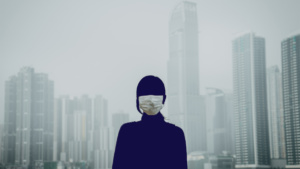
A display of Christopher Kardambikis’s “Paper Cuts/Live” exhibit at Washington Project for the Arts. WPA stands to lose $112,700 in funding from the DCCAH by not signing the memorandum. (Washington Project for the Arts)
Responding to protests from Washington artists and arts leaders, the D.C. Commission on the Arts and Humanities has reversed a controversial new measure to censor its grant recipients.
On Monday, the city’s arts agency added sweeping language to already approved grants requiring that artists and arts organizations avoid producing work that could be considered lewd, vulgar or political or be at risk of losing their funds.
The arts community protested, saying the amended contract infringed on their First Amendment rights. The DCCAH capitulated.
“The DC Commission on Arts and Humanities believes deeply in the right to freedom of expression and would never seek to violate that right by censoring the work of any grantee,” the commission said in a statement. “Mayor Bowser’s steadfast commitment to our diverse and vibrant Arts and Humanities community will not waver. We look forward to a continued investment and collaboration with our District creative community.”
D.C. Council member Jack Evans (D-Ward 2) said, “This was an ill-advised idea. It should not have been sent out.”
The short-lived controversy sent shock waves through the city’s arts community and had many recalling the 1980s culture wars that pushed the National Endowment for the Arts to stop funding individual artists.

Joanne “Rocky” Delaplaine at the Split This Rock Poetry Festival in April. A group from the festival created these signs and a group poem against gun violence at Lafayette Park on April 20, to coincide with the National Student Walk-out that day. (Kristin Adair)
“My first reaction was just astonishment,” said Sarah Browning, co-founder and executive director of Split This Rock, which has been awarded $70,000 in two grants from the commission. Browning herself won a $3,500 grant for poetry.
“It’s far outside the reach of anything that I’ve ever seen,” Browning said. “To put it at risk is a huge problem for small organizations like ours. That said, we can’t possibly sign this.”
In a rare step made after millions of dollars in public funding was approved last month, DCCAH Interim Executive Director Angie Gates asked grant recipients to sign the amendment that said the commission would terminate any grant supporting work that it deemed “lewd, lascivious, vulgar, overtly political, or excessively violent, constitutes sexual harassment, or is, in any other way, illegal.”
The DCCAH provides grants and other support to city music, theater, dance and other organizations, using money from D.C. government and the National Endowment for the Arts. Composed of 15 volunteer members who are appointed by the mayor, the commission approved more than 400 grants to individuals and arts organizations totaling about $12.9 million for 2019, according to its website.
The commission was reacting to criticism of an exhibition at the Reeves Center on 14th Street NW last month that was intended to raise awareness of domestic violence. The DCCAH awarded $50,000 to artist Marta Perez Garcia to create the work, which included cloth dolls made by survivors of abuse that were suspended in a way that made at least one visitor upset because it seemed to depict a lynching.
The amendment’s vague language was troubling for many reasons, said Deepak Gupta, a constitutional lawyer who works with the American Civil Liberties Union on behalf of local artists. For example, Gupta said an artwork or poem that criticizes President Trump could be considered “overtly political” and thus in violation of the grant contract.
“What [DCCAH] is saying is, if you take this money, we reserve the right to essentially censor your work,” Gupta said. “That’s an affront to basic First Amendment values. If there’s one thing we know about the First Amendment, it’s that the government doesn’t have the right to tell you what you can say regarding politics or sex.”
Arts groups and other organizations, including the National Coalition Against Censorship, described the amendment as “an attack on artistic freedom” that could have a chilling effect on artistic expression. Andy Warhol Foundation for the Visual Arts President Joel Wachs described the requirement as “a direct threat” to those who produce challenging work.
“The DCCAH’s revised language defies the First Amendment, censoring artistic freedom in the city in which we live and make our art. This new grant agreement flies in the face of the freedoms that our democracy was founded upon, and we strenuously object to it,” Woolly Mammoth Theatre Company leaders Maria Manuela Goyanes and Meghan Pressman said in a statement.
Washington Project for the Arts Executive Director Peter Nesbett said his organization could not agree to the amendment even if it jeopardized the almost $113,000 in funding it was awarded for 2019.
“Its’ a big deal for us to not sign it. It’s a lot of money. But as an organization we are totally committed to protecting the rights of artists,” he said.
“The quick and decisive mobilization of D.C.’s arts community against this ill-conceived amendment is truly inspiring. Now we have to make sure that the amendment is truly rescinded, that artists and organizations that signed it are not bound by its restrictive conditions,” Nesbett said.
Original article from: www.washingtonpost.com
